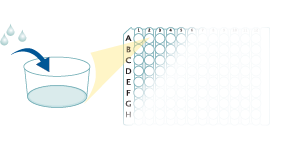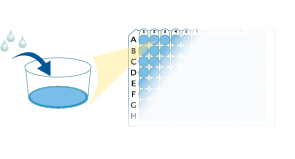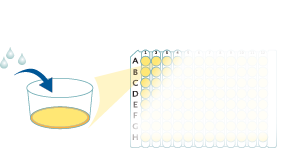Mouse G-CSF Quantikine ELISA Kit Summary
Product Summary
Recovery
The recovery of mouse G-CSF spiked to three levels throughout the range of the assay in various matrices was evaluated.
| Sample Type | Average % Recovery | Range % |
|---|---|---|
| Cell Culture Supernates (n=7) | 92 | 82-110 |
| Serum (n=5) | 96 | 80-119 |
Linearity
Scientific Data
 View Larger
View Larger
Detection of Mouse G-CSF by ELISA Neutralization of TNF Ameliorates Inflammation Caused by OTULIN Deficiency(A–J) Measurements from tamoxifen (tx)-treated (arrows) CreERT2-Otulinflox bone marrow chimeras injected with (A–C) anti-TNF neutralizing antibodies ( alpha TNF) (data were pooled from two independent experiments), (D–F) anti-G-CSF-neutralizing antibodies ( alpha G-CSF), (G–I) anti-IL-6-neutralizing antibodies ( alpha IL-6), or isotype control as indicated.(A, D, and G) Body weight of CreERT2-Otulinflox chimeric mice treated with neutralizing antibodies as indicated.(B, E, and H) Blood neutrophil counts from CreERT2-Otulinflox chimeric mice treated as indicated.(C, F, and I) Total number of infiltrating CD11b+Gr-1+ neutrophils in spleen and peritoneal lavage (PL) measured by flow cytometry from CreERT2-Otulinflox chimeric mice treated as indicated.(J) Heatmap of Luminex multiplex analysis of cytokines and chemokines in serum from terminal bleeds on days 6 or 7 from chimeric mice treated as indicated. Numbers indicate relative change compared to isotype-treated del/flox mice within each experiment. G-CSF levels for alpha G-CSF and alpha IL-6 were measured by ELISA. Asterisks (∗) indicate the level of statistical significance.(K) Model of TNF-driven systemic inflammation and the contributions from different cytokines in OTULIN-deficient mice.(A–J) Data are presented as mean ± SEM, and n represents number of mice.See also Figure S3. Image collected and cropped by CiteAb from the following publication (https://pubmed.ncbi.nlm.nih.gov/27523608), licensed under a CC-BY license. Not internally tested by R&D Systems.
Product Datasheets
Preparation and Storage
Background: G-CSF
Mouse granulocyte-colony stimulating factor (G-CSF) is a 24-25 kDa monomeric glycoprotein that regulates the proliferation, differentiation and activation of hematopoietic cells. Mouse G-CSF cDNA encodes a 208 amino acid (aa) precursor protein with a 30 aa signal sequence that is proteolytically cleaved to form a 178 aa O-glycosylated mature protein containing two intrachain disulfide bridges. In humans, two distinct cDNA clones, encoding a 204 aa form and a minor alternatively spliced 207 aa form of G-CSF precursors, have been isolated. Mouse and human G-CSF are 76% identical at the aa sequence level and the two proteins show species cross-reactivity. G-CSF is produced primarily by monocytes and macrophages upon activation by endotoxin, TNF-alpha or IL-1. Other cell types, including fibroblasts, endothelial cells, astrocytes and bone marrow stroma cells, can also secrete G-CSF after activation. In addition, various tumor cells express G-CSF constitutively.
Assay Procedure
Refer to the product- Prepare all reagents, standard dilutions, and samples as directed in the product insert.
- Remove excess microplate strips from the plate frame, return them to the foil pouch containing the desiccant pack, and reseal.
- Add 50 µL of Assay Diluent to each well.
- Add 50 µL of Standard, Control, or sample to each well. Cover with a plate sealer, and incubate at room temperature for 2 hours.
- Aspirate each well and wash, repeating the process 4 times for a total of 5 washes.
- Add 100 µL of Conjugate to each well. Cover with a new plate sealer, and incubate at room temperature for 2 hours.
- Aspirate and wash 5 times.
- Add 100 µL Substrate Solution to each well. Incubate at room temperature for 30 minutes. PROTECT FROM LIGHT.
- Add 100 µL of Stop Solution to each well. Read at 450 nm within 30 minutes. Set wavelength correction to 540 nm or 570 nm.





Citations for Mouse G-CSF Quantikine ELISA Kit
R&D Systems personnel manually curate a database that contains references using R&D Systems products. The data collected includes not only links to publications in PubMed, but also provides information about sample types, species, and experimental conditions.
51
Citations: Showing 1 - 10
Filter your results:
Filter by:
-
Tumor Growth Ameliorates Cardiac Dysfunction and Suppresses Fibrosis in a Mouse Model for Duchenne Muscular Dystrophy
Authors: Achlaug, L;Awwad, L;Langier Goncalves, I;Goldenberg, T;Aronheim, A;
International journal of molecular sciences
Species: Mouse
Sample Types: Serum
-
The microbiota regulates hematopoietic stem cell fate decisions by controlling iron availability in bone marrow
Authors: D Zhang, X Gao, H Li, DK Borger, Q Wei, E Yang, C Xu, S Pinho, PS Frenette
Cell Stem Cell, 2022-01-21;0(0):.
Species: Mouse
Sample Types: Bone Marrow Fluid
-
Hepatocyte-specific glucose-6-phosphatase deficiency disturbs platelet aggregation and decreases blood monocytes upon fasting-induced hypoglycemia
Authors: AM La Rose, V Bazioti, JA Hoogerland, AF Svendsen, AG Groenen, M van Faasse, MGS Rutten, NJ Kloosterhu, B Dethmers-A, JH Nijland, G Mithieux, F Rajas, F Kuipers, MV Lukens, O Soehnlein, MH Oosterveer, M Westerterp
Molecular Metabolism, 2021-06-04;53(0):101265.
Species: Mouse
Sample Types: Plasma
-
Effects of protein malnutrition on haematopoietic regulatory activity of bone marrow mesenchymal stem cells
Authors: AA Hastreiter, GG Dos Santos, EN Makiyama, EWC Santos, P Borelli, RA Fock
The Journal of nutritional biochemistry, 2021-03-08;0(0):108626.
Species: Mouse
Sample Types: Cell Culture Supernates
-
AIM2 in regulatory T cells restrains autoimmune diseases
Authors: WC Chou, Z Guo, H Guo, L Chen, G Zhang, K Liang, L Xie, X Tan, SA Gibson, E Rampanelli, Y Wang, SA Montgomery, WJ Brickey, M Deng, L Freeman, S Zhang, MA Su, X Chen, YY Wan, JP Ting
Nature, 2021-01-27;0(0):.
Species: Mouse
Sample Types: Tissue Homogenates
-
Impaired RIPK1 ubiquitination sensitizes mice to TNF toxicity and inflammatory cell death
Authors: M Kist, LG K?m?ves, T Goncharov, DL Dugger, C Yu, M Roose-Girm, K Newton, JD Webster, D Vucic
Cell Death Differ, 2020-09-30;0(0):.
Species: Mouse
Sample Types: Serum
-
Suppressing neutrophil-dependent angiogenesis abrogates resistance to anti-VEGF antibody in a genetic model of colorectal cancer
Authors: Y Itatani, T Yamamoto, C Zhong, AA Molinolo, J Ruppel, P Hegde, MM Taketo, N Ferrara
Proc. Natl. Acad. Sci. U.S.A., 2020-08-19;0(0):.
Species: Mouse
Sample Types: Serum
-
Targeting myeloid-derived suppressor cells in combination with primary mammary tumor resection reduces metastatic growth in the lungs
Authors: M Bosiljcic, RA Cederberg, MJ Hamilton, NE LePard, BT Harbourne, JL Collier, EC Halvorsen, R Shi, SE Franks, AY Kim, JP Banáth, M Hamer, FM Rossi, KL Bennewith
Breast Cancer Res., 2019-09-05;21(1):103.
Species: Mouse
Sample Types: Serum
-
G-CSF partially mediates effects of sleeve gastrectomy on the bone marrow niche
Authors: Z Li, J Hardij, SS Evers, CR Hutch, SM Choi, Y Shao, BS Learman, KT Lewis, RL Schill, H Mori, DP Bagchi, SM Romanelli, KS Kim, E Bowers, C Griffin, RJ Seeley, K Singer, DA Sandoval, CJ Rosen, OA MacDougald
J. Clin. Invest., 2019-05-06;129(6):2404-2416.
Species: Mouse
Sample Types: Serum
-
Complement receptor C3aR1 controls neutrophil mobilization following spinal cord injury through physiological antagonism of CXCR2
Authors: FH Brennan, T Jogia, ER Gillespie, LV Blomster, XX Li, B Nowlan, GM Williams, E Jacobson, GW Osborne, FA Meunier, SM Taylor, KE Campbell, KP MacDonald, JP Levesque, TM Woodruff, MJ Ruitenberg
JCI Insight, 2019-05-02;4(9):.
Species: Mouse
Sample Types: Tissue Homogenates
-
Modulating bone marrow hematopoietic lineage potential to prevent bone metastasis in breast cancer
Authors: JM Ubellacker, N Baryawno, N Severe, MJ DeCristo, J Sceneay, JN Hutchinson, MT Haider, CS Rhee, Y Qin, WM Gregory, AC Garrido-Ca, I Holen, JE Brown, RE Coleman, DT Scadden, SS McAllister
Cancer Res., 2018-07-31;0(0):.
Species: Mouse
Sample Types: Plasma
-
Tumor-independent host secretomes induced by angiogenesis and immune-checkpoint inhibitors
Authors: M Mastri, CR Lee, A Tracz, RS Kerbel, M Dolan, Y Shi, JML Ebos
Mol. Cancer Ther., 2018-04-25;0(0):.
Species: Mouse
Sample Types: Plasma
-
Pentosan Polysulfate Treatment of Mucopolysaccharidosis Type IIIA Mice
Authors: N Guo, V DeAngelis, C Zhu, EH Schuchman, CM Simonaro
JIMD Rep, 2018-04-14;0(0):.
Species: Mouse
Sample Types: Plasma
-
Inhibition of Dpp8/9 Activates the Nlrp1b Inflammasome
Authors: MC Okondo, SD Rao, CY Taabazuing, AJ Chui, SE Poplawski, DC Johnson, DA Bachovchin
Cell Chem Biol, 2018-01-27;0(0):.
Species: Mouse
Sample Types: Serum
-
The Toll-Like Receptor 2/6 Agonist, FSL-1 Lipopeptide, Therapeutically Mitigates Acute Radiation Syndrome
Authors: CJ Kurkjian, H Guo, ND Montgomery, N Cheng, H Yuan, JR Merrill, GD Sempowski, WJ Brickey, JP Ting
Sci Rep, 2017-12-11;7(1):17355.
Species: Mouse
Sample Types: Serum
-
Calf Spleen Extractive Injection protects mice against cyclophosphamide-induced hematopoietic injury through G-CSF-mediated JAK2/STAT3 signaling
Authors: W Lu, D Jia, S An, M Mu, X Qiao, Y Liu, X Li, D Wang
Sci Rep, 2017-08-21;7(1):8402.
Species: Mouse
Sample Types: Plasma
-
Cannabinoid Receptor 2 Modulates Neutrophil Recruitment in a Murine Model of Endotoxemia
Authors: TS Kapellos, C Recio, DR Greaves, AJ Iqbal
Mediators Inflamm., 2017-08-09;2017(0):4315412.
Species: Mouse
Sample Types: Serum
-
Peptidoglycan accelerates granulopoiesis through a TLR2- and MyD88-dependent pathway
Authors: M Takehara, S Seike, T Takagishi, K Kobayashi, M Nagahama
Biochem. Biophys. Res. Commun., 2017-04-15;487(2):419-425.
Species: Mouse
Sample Types: Cell Culture Supernates
-
Growth and metastasis of lung adenocarcinoma is potentiated by BMP4-mediated immunosuppression
Authors: Limo Chen
Oncoimmunology, 2016-09-26;5(11):e1234570.
Species: Mouse
Sample Types: Tissue Homogenates
-
Key role for neutrophils in radiation-induced antitumor immune responses: Potentiation with G-CSF
Proc Natl Acad Sci USA, 2016-09-20;0(0):.
Species: Mouse
Sample Types: Tissue Homogenates
-
The Deubiquitinase OTULIN Is an Essential Negative Regulator of Inflammation and Autoimmunity
Cell, 2016-08-11;0(0):.
Species: Mouse
Sample Types: Serum
-
Pten Cell Autonomously Modulates the Hematopoietic Stem Cell Response to Inflammatory Cytokines
Stem Cell Reports, 2016-05-12;0(0):.
Species: Mouse
Sample Types: Serum
-
Neutrophils suppress intraluminal NK-mediated tumor cell clearance and enhance extravasation of disseminated carcinoma cells
Authors: A Spiegel, MW Brooks, S Houshyar, F Reinhardt, M Ardolino, E Fessler, MB Chen, JA Krall, J DeCock, IK Zervantona, A Iannello, Y Iwamoto, V Cortez-Ret, RD Kamm, MJ Pittet, DH Raulet, RA Weinberg
Cancer Discov, 2016-04-12;0(0):.
Species: Mouse
Sample Types: Plasma
-
SB203580 increases G-CSF production via a stem-loop destabilizing element in the 3' untranslated region in macrophages independently of its effect on p38 MAPK activity.
Authors: Chang S, Li H, Huang Y, Tasi W, Chou Y, Lu S
J Biomed Sci, 2016-01-16;23(1):3.
Species: Mouse
Sample Types: Cell Culture Supernates
-
gammadelta T Cells Are Required for M2 Macrophage Polarization and Resolution of Ozone-Induced Pulmonary Inflammation in Mice.
Authors: Mathews J, Kasahara D, Ribeiro L, Wurmbrand A, Ninin F, Shore S
PLoS ONE, 2015-07-02;10(7):e0131236.
Species: Mouse
Sample Types: BALF
-
LPS-Induced G-CSF Expression in Macrophages Is Mediated by ERK2, but Not ERK1.
Authors: Chang S, Lin S, Yang H, Chou Y, Gao J, Lu S
PLoS ONE, 2015-06-26;10(6):e0129685.
Species: Mouse
Sample Types: Cell Culture Supernates
-
Coordinate expansion of murine hematopoietic and mesenchymal stem cell compartments by SHIPi.
Authors: Brooks R, Iyer S, Akada H, Neelam S, Russo C, Chisholm J, Kerr W
Stem Cells, 2015-03-01;33(3):848-58.
Species: Mouse
Sample Types: Serum
-
SHIP1-expressing mesenchymal stem cells regulate hematopoietic stem cell homeostasis and lineage commitment during aging.
Authors: Iyer S, Brooks R, Gumbleton M, Kerr W
Stem Cells Dev, 2015-02-05;24(9):1073-81.
Species: Mouse
Sample Types: Serum
-
Endothelial cells translate pathogen signals into G-CSF-driven emergency granulopoiesis.
Authors: Boettcher S, Gerosa R, Radpour R, Bauer J, Ampenberger F, Heikenwalder M, Kopf M, Manz M
Blood, 2014-07-02;124(9):1393-403.
Species: Mouse
Sample Types: Plasma
-
Cardiac fibroblasts mediate IL-17A-driven inflammatory dilated cardiomyopathy.
Authors: Wu L, Ong S, Talor M, Barin J, Baldeviano G, Kass D, Bedja D, Zhang H, Sheikh A, Margolick J, Iwakura Y, Rose N, Cihakova D
J Exp Med, 2014-06-16;211(7):1449-64.
Species: Mouse
Sample Types: Cell Culture Supernates
-
Blockade of Fas signaling in breast cancer cells suppresses tumor growth and metastasis via disruption of Fas signaling-initiated cancer-related inflammation.
Authors: Liu Q, Tan Q, Zheng Y, Chen K, Qian C, Li N, Wang Q, Cao X
J Biol Chem, 2014-03-13;289(16):11522-35.
Species: Mouse
Sample Types: Whole Cells
-
Central role of conventional dendritic cells in regulation of bone marrow release and survival of neutrophils.
Authors: Jiao, Jingjing, Dragomir, Ana-Cris, Kocabayoglu, Peri, Rahman, Adeeb H, Chow, Andrew, Hashimoto, Daigo, Leboeuf, Marylene, Kraus, Thomas, Moran, Thomas, Carrasco-Avino, Gonzalo, Friedman, Scott L, Merad, Miriam, Aloman, Costica
J Immunol, 2014-03-03;192(7):3374-82.
Species: Mouse
Sample Types: Plasma
-
Erythropoietin guides multipotent hematopoietic progenitor cells toward an erythroid fate.
Authors: Grover, Amit, Mancini, Elena, Moore, Susan, Mead, Adam J, Atkinson, Deborah, Rasmussen, Kasper D, O'Carroll, Donal, Jacobsen, Sten Eir, Nerlov, Claus
J Exp Med, 2014-02-03;211(2):181-8.
Species: Mouse
Sample Types: Serum
-
Protein malnutrition induces bone marrow mesenchymal stem cells commitment to adipogenic differentiation leading to hematopoietic failure.
Authors: Cunha M, Lima F, Vinolo M, Hastreiter A, Curi R, Borelli P, Fock R
PLoS ONE, 2013-03-14;8(3):e58872.
Species: Mouse
Sample Types: Cell Culture Supernates
-
Steady-state neutrophil homeostasis is dependent on TLR4/TRIF signaling.
Authors: Bugl S, Wirths S, Radsak M, Schild H, Stein P, Andre M, Muller M, Malenke E, Wiesner T, Marklin M, Frick J, Handgretinger R, Rammensee H, Kanz L, Kopp H
Blood, 2012-12-05;121(5):723-33.
Species: Mouse
Sample Types: Plasma
-
Conditional TRF1 knockout in the hematopoietic compartment leads to bone marrow failure and recapitulates clinical features of dyskeratosis congenita.
Authors: Beier, Fabian, Foronda, Miguel, Martinez, Paula, Blasco, Maria A
Blood, 2012-08-29;120(15):2990-3000.
Species: Mouse
Sample Types: Serum
-
Tumor-derived G-CSF facilitates neoplastic growth through a granulocytic myeloid-derived suppressor cell-dependent mechanism.
Authors: Waight JD, Hu Q, Miller A, Liu S, Abrams SI
PLoS ONE, 2011-11-16;6(11):e27690.
Species: Mouse
Sample Types: Cell Culture Supernates
-
Deletion of tristetraprolin caused spontaneous reactive granulopoiesis by a non-cell-autonomous mechanism without disturbing long-term hematopoietic stem cell quiescence.
Authors: Kaplan IM, Morisot S, Heiser D, Cheng WC, Kim MJ, Civin CI
J. Immunol., 2011-01-26;186(5):2826-34.
Species: Mouse
Sample Types: Plasma
-
Bcl3 prevents acute inflammatory lung injury in mice by restraining emergency granulopoiesis.
Authors: Kreisel D, Sugimoto S, Tietjens J, Zhu J, Yamamoto S, Krupnick AS, Carmody RJ, Gelman AE
J. Clin. Invest., 2010-12-13;121(1):265-76.
Species: Mouse
Sample Types: Serum
-
Severe congenital neutropenia resulting from G6PC3 deficiency with increased neutrophil CXCR4 expression and myelokathexis.
Authors: McDermott DH, De Ravin SS, Jun HS
Blood, 2010-07-08;116(15):2793-802.
Species: Mouse
Sample Types: Serum
-
Rapid chemotherapy-induced acute endothelial progenitor cell mobilization: implications for antiangiogenic drugs as chemosensitizing agents.
Authors: Shaked Y, Henke E, Roodhart JM, Mancuso P, Langenberg MH, Colleoni M, Daenen LG, Man S, Xu P, Emmenegger U, Tang T, Zhu Z, Witte L, Strieter RM, Bertolini F, Voest EE, Benezra R, Kerbel RS
Cancer Cell, 2008-09-09;14(3):263-73.
Species: Mouse
Sample Types: Plasma
-
The role of Rac2 in regulating neutrophil production in the bone marrow and circulating neutrophil counts.
Authors: Gomez JC, Soltys J, Okano K, Dinauer MC, Doerschuk CM
Am. J. Pathol., 2008-06-26;173(2):507-17.
Species: Mouse
Sample Types: Plasma
-
Multiple circulating proangiogenic factors induced by sunitinib malate are tumor-independent and correlate with antitumor efficacy.
Authors: Ebos JM, Lee CR, Christensen JG, Mutsaers AJ, Kerbel RS
Proc. Natl. Acad. Sci. U.S.A., 2007-10-17;104(43):17069-74.
Species: Mouse
Sample Types: Plasma
-
Regulation of systemic and local neutrophil responses by G-CSF during pulmonary Pseudomonas aeruginosa infection.
Authors: Gregory AD, Hogue LA, Ferkol TW, Link DC
Blood, 2006-12-21;109(8):3235-43.
Species: Mouse
Sample Types: Epithelial Fluid
-
Bone marrow-derived cells require a functional glucose 6-phosphate transporter for normal myeloid functions.
Authors: Kim SY, Nguyen AD, Gao JL, Murphy PM, Mansfield BC, Chou JY
J. Biol. Chem., 2006-08-04;281(39):28794-801.
Species: Mouse
Sample Types: Plasma
-
Enalapril increases ischemia-induced endothelial progenitor cell mobilization through manipulation of the CD26 system.
Authors: Wang CH, Verma S, Hsieh IC, Chen YJ, Kuo LT, Yang NI, Wang SY, Wu MY, Hsu CM, Cheng CW, Cherng WJ
J. Mol. Cell. Cardiol., 2006-05-05;41(1):34-43.
Species: Mouse
Sample Types: Plasma
-
A novel polysaccharide of black soybean promotes myelopoiesis and reconstitutes bone marrow after 5-flurouracil- and irradiation-induced myelosuppression.
Authors: Liao HF, Chen YJ, Yang YC
Life Sci., 2005-02-25;77(4):400-13.
Species: Mouse
Sample Types: Cell Culture Supernates
-
Granulocyte colony-stimulating factor: release is not impaired after burn wound infection.
Authors: Gamelli R, He LK, Hahn E
J Trauma, 2002-08-01;53(2):284-9; discus.
Species: Mouse
Sample Types: Serum
-
Modulation of marrow proliferation and chemosensitivity by tumor-produced cytokines from syngeneic pancreatic tumor lines.
Authors: Blumenthal RD, Reising A, Leon E
Clin. Cancer Res., 2002-05-01;8(5):1301-9.
Species: Mouse
Sample Types: Cell Culture Supernates
-
The IL-6 family cytokines, interleukin-6, interleukin-11, oncostatin M, and leukemia inhibitory factor, enhance mast cell growth through fibroblast-dependent pathway in mice.
Authors: Gyotoku E, Morita E, Kameyoshi Y, Hiragun T, Yamamoto S, Hide M
Arch. Dermatol. Res., 2001-11-01;293(10):508-14.
Species: Mouse
Sample Types: Cell Culture Supernates
FAQs
No product specific FAQs exist for this product, however you may
View all ELISA FAQsReviews for Mouse G-CSF Quantikine ELISA Kit
Average Rating: 4.6 (Based on 7 Reviews)
Have you used Mouse G-CSF Quantikine ELISA Kit?
Submit a review and receive an Amazon gift card.
$25/€18/£15/$25CAN/¥75 Yuan/¥2500 Yen for a review with an image
$10/€7/£6/$10 CAD/¥70 Yuan/¥1110 Yen for a review without an image
Filter by:






